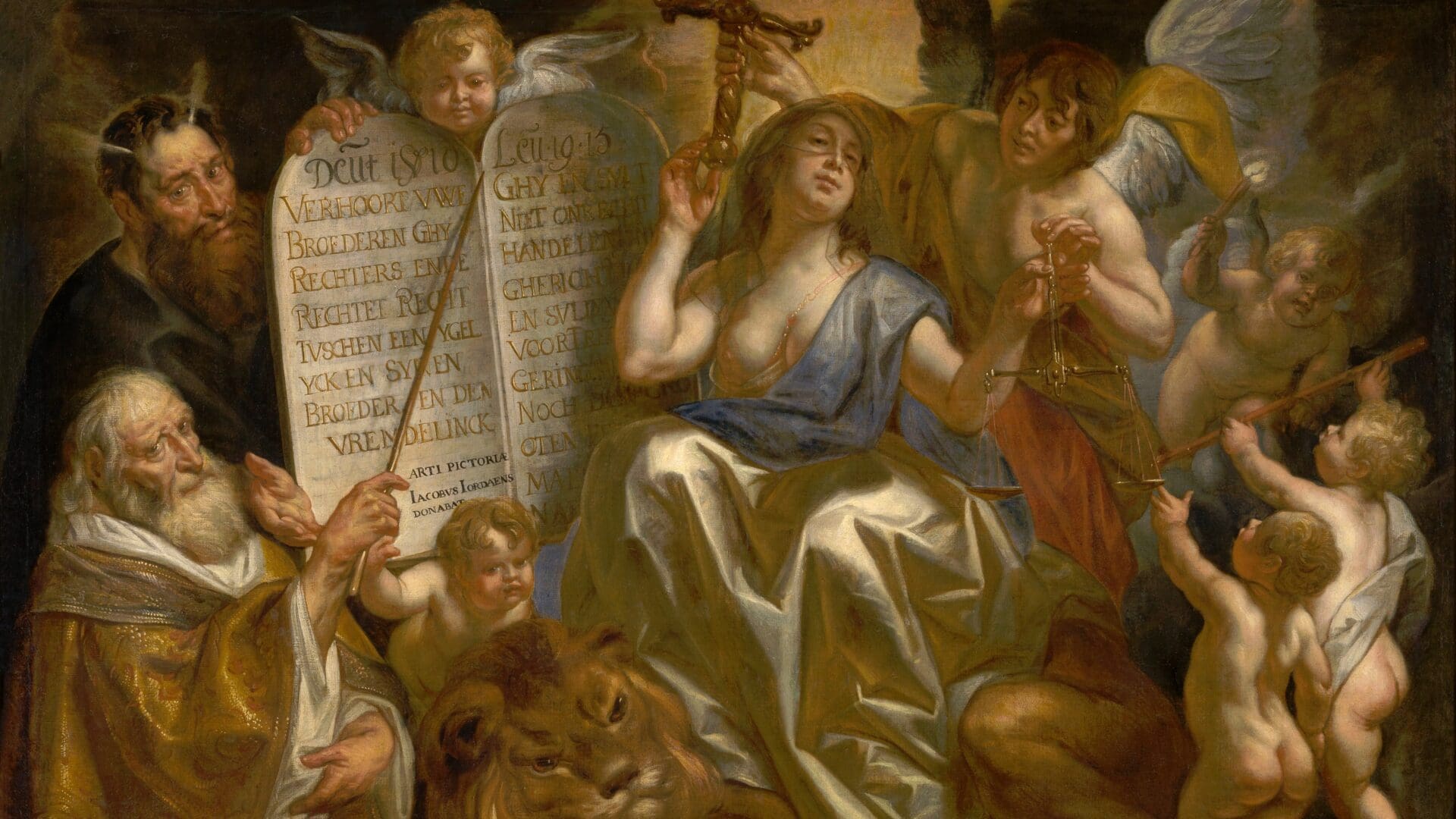Last Thursday marked the 750th anniversary of perhaps the most renowned theologian raised to the altars of the Roman Catholic Church, St Thomas Aquinas (1224/25–1274). His feast day, originally celebrated on 7 March in the traditional liturgical calendar, was pushed back to 28 January in 1970 since it was always superseded by the penitential season of Lent. Among his most notable teachings were those on the Eucharist, the Five Proofs for the existence of God, and his exposition on the Our Father. There is also his exegesis on law, which is seen by certain scholars as his greatest contribution.
Indeed, the notion of law reached new heights in the thirteenth century with Aquinas. Building upon the jurisprudence of the father of canon law, Gratian (11th c.–1159?), who synthesized and harmonized the works of Roman jurists and the theological traditions, the Angelic Doctor developed the concept of law as that which is both absolute and rational, ordained by God Himself. Consequently, since God’s reason cannot be subjected to time, His law must be eternal. Its end, ‘to make all men virtuous’.[i]
Christendom at the time of Aquinas, despite having a centralized system of Christian doctrine and values, had social inequalities, such as serfdom, which led to the exploitation of various human individuals by those who wielded political authority. It was within this historical context, toward the end of High to the beginning of the Late Middle Ages (1200–1300), that St Thomas refined the notion of law—expressed, like in Roman antiquity, in two distinct and interchangeable terms, ius and lex.
In his zeal to ensure justice and equality, even though he was not a jurist, Aquinas complemented canon and civil lawyers’ treatment of law to the point that essentially provided a spiritual fervour to it, with the goal of the salus animarum (‘the salvation of souls’).
Discourse on Ius
Aquinas identifies ius as natural by its very principle since it is instilled in nature, vis-à-vis, human law. He parallels the juridical understanding of ius of the time, which included ius positivum (positive law)—a new term for describing man-made law that canon lawyers introduced into ecclesiastical jurisprudence at the end of the twelfth century.
It has been argued by scholars that since ‘canonists often used the word ius to mean a subjective right and when Aquinas discussed the same or similar issues […] he unreflectively borrowed their language’. For example, in his Commentary on the Sentences of Peter Lombard, where he cites Justinian’s Code to explain how the status of serfdom cannot be an impediment to marriage, he says:
‘Further, if marriage is impeded, the impediment would come from natural law (iure naturali) or from positive law (iure positivo). However, natural law does not dictate an impediment since according to natural law all men are equal…. [I]n the beginning of the Digest [of Justinian’s Code] it is said that servitude had no place in natural law; and positive law descends from natural law, as Cicero says. Therefore, according to no law (nullum ius) can servitude be an impediment to marriage.’
Aquinas’ usage of ius is thus understood, in accordance with Gratian’s explanation of ius naturæ (‘the law of nature’), and within the context of the Golden Rule, as a right because it is the object of justice. For this to be accomplished, one is to exercise proper judgement which must be in accordance with the written laws (leges scriptas).[ii]
Discourse on Lex
Aquinas defines lex as nothing other than ‘an ordinance of reason for the common good, made by him who has care of the perfect community and promulgated.’[iii] There is here a link to Cicero’s explanation of lex as the ‘rational principle’ that undergirded all law[iv] when he said:
‘Therefore, the most learned men decided to proceed from the law [a lege]…lex is the highest reason [ratio summa], inherent in nature, which enjoins what ought to be done and forbids the opposite. When that reason is fully formed and completed in the human mind, it, too, is lex.’[v]
St Thomas cautions, however, that although written law does not establish natural right, it is nevertheless contained in it wherefrom it derives its force.[vi]
Aquinas, like Cicero, states that man has this natural inclination, but it is aligned with reason so that he may do what ‘is [naturally] proper to him,’[vii] which is to do good and avoid evil. He insists that lex is altogether different from ius because, as St Isidore of Seville before him had stated, the lex is a ‘written decree’, which, for St Thomas, resides in the Eternal law of God, whereas ius is an expression of a ‘right’.[viii]
Eternal law (lex æterna), thus, is the Supreme (Divine) Reason which governs the world and is unchangeable and ‘includes his foreknowledge and preordination of created beings and their contingent motions and actions’.[ix] It is not ordained to any extrinsic end because the end of divine government is God himself. Eternal law is the basis of all other forms of law, for the world is moved and governed by God.[x]
Lex, thus, has a ‘statutory’ character because God ‘is the supreme legislator’.[xi] It is a rule and measure of acts, whereby man is induced to act or is restrained from acting; for lex is derived from ligare (‘to bind’), because it binds one to act,[xii] whereas ius does not. And since the divine reason is infinite, the law by which God governs must likewise be eternal.[xiii] Hence, the divine wisdom and providence directing all actions and movements is the ‘lex æterna’. It constitutes the final authority to which man has to turn ‘in order…that he might…know without any doubt what he ought to do and what he ought to avoid’.[xiv]
From this fundamental tenet can be found the ‘general and indemonstrable principles known to all’, i.e., the natural (moral) law that abets the observance of human law— particular developments of natural law worked out by human reason.[xv] These general principles of right and lawful action are discovered by speculative reason, which cannot be erased form the hearts of man.[xvi] Hence, the prevalence of lex naturale over ius naturale as the law that is inscribed in man for him to partake in the rule and measure of things, i.e., ‘the rational creature’s participation of the eternal law’.[xvii]
When he speaks of Divine law (lex divina), i.e., God’s precepts revealed in both Old and New Testaments, he says it ‘presupposes the natural law’ for because of the effects of original sin, man’s reason became obscured,[xviii] it left man’s capacity to reason between what is right and wrong impaired.
[i] Summa Theologiæ, II, IIæ, Q. 122, r. obj. 1.
[ii] Summa Theologiae, II, IIæ, Q. 60, a.6.
[iii] Op. cit. I, IIæ, Q. 91, a.1.
[iv] See Michael J. White, ‘How Ius (Right) became Distinguished from Lex (Law): Two Early Episodes in the Story’, in History of Political Thought, Vol. XL. No. 4. Exeter: Imprint Academic, Winter 2019; cfr. Francisco Leonardo Lisi, ‘La noción de ley natural en Cicerón’, in Etica & Politica, XVI, 2. Trieste: Università degli Studi di Trieste, 2014, 217-232.
[v] Marcus Tullius Cicero, De Legibus, I. 18. Minton Keynes: Jihau Books, 2014, 10.
[vi] Summa Theologiæ, II, IIæ, Q. 60, a.5.
[vii] Op. cit., I, IIæ, Q. 94, art. 4.
[viii] Ibid., IIa, IIæ, Q. 57, a.1.
[ix] Oliver O’Donovan — Joan Lockwood O’Donovan, From Irenaeus to Grotius: A Sourcebook in Christian Political Thought. B. Eerdmans Publishing Co., Grand Rapids 1999, 324.
[x] David Van Drunen, ‘Natural Law, Custom, and Common Law in the Theology of Aquinas and Calvin’, in UBC Law Review, Vol. 33:3. University of British Columbia, Vancouver 2000, 701.
[xi] James Bernard Murphy, Philosophy of Positive Law: Foundations of Jurisprudence, Yale University Press, New Haven 2005, 50, 81.
[xii] Summa Theologiæ, Ia, IIæ Q. 90, a.1.
[xiii] Summa Theologiæ, I, IIæ, Q. 91.
[xiv] Op. cit., I, IIæ, Q. 94, art. 2.
[xv] Ibid., I, IIæ, Q. 95, a. 1.
[xvi] Ibid., IIæ, Q. 91, a.4.
[xvii] Ibid., I, IIæ, Q. 91, a.2. Aquinas says that because of the effects of original sin, man, no longer being able to observe the natural law as it became obscured, became in need of divine law (lex divina), which ‘presupposes the natural law’. I, IIæ Q. 99, a. 2, ad.1 & 2.
[xviii] Ia, IIæ q. 99, a. 2, ad.1 & 2, 1253. See also, St. Irenæus, ‘Adversus hæreses’, 4, 15, 1, in Catechism of the Catholic Church. Vatican City, Libreria Editrice Vaticana, 1994, 503.








